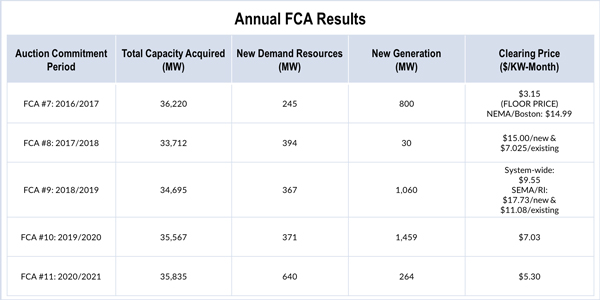By Michael Kuser
Stakeholders have responded to ISO-NE’s filing of a proposed two-stage capacity auction with a flurry of comments to FERC — many of them opposing the measure.
The vetting process for the Competitive Auctions with Sponsored Policy Resources (CASPR) proposal, and the late changes made by the RTO, left state regulators and stakeholders divided. Vermont, Connecticut and Rhode Island opposed the CASPR proposal filed with FERC, while Massachusetts, New Hampshire and Maine supported it. (See ISO-NE Effort to Accommodate States Leaves them Alienated.)
The proposal (ER18-619) grew out of the New England Power Pool’s Integrating Markets and Public Policy (IMAPP) initiative, launched in August 2016 to address state regulators’ concerns about ratepayer costs associated with policy-driven resources and generators’ fears that out-of-market procurements of renewable generation would suppress capacity prices.
Bay State Division
The controversy has even split officials within Massachusetts. In separate comments filed Jan. 29, the state’s attorney general urged the commission to reject or change the proposal, while the Department of Public Utilities “strongly” supported it.
Attorney General Maura Healey said in her filing that “the current incarnation of CASPR does not allow for any regular or reliable integration of sponsored policy resources” into the Forward Capacity Market.
Healey asked the commission to reject CASPR “because it will lead to unjust and unreasonable rates for New England consumers, who will pay twice for the same capacity,” and remand it with an order for remedial action to incorporate a mechanism like the “backstop” proposed by the New England States Committee on Electricity, which would guarantee entry into the FCM every year for a minimum of 200 MW of sponsored policy resources.
She also suggested the commission could remand the proposal with an order to reinstate the renewable technology resource (RTR) exemption to the minimum offer price rule (MOPR), which CASPR proposes to eliminate.
The DPU, on the other hand, argued that CASPR would “provide a competitive, market-based approach” to allowing policy-driven resource into the FCM and “prevent direct harm to Massachusetts ratepayers and the inefficient development of more generation resources than the region requires, while preserving competitive price formation and nondiscriminatory participation in New England’s FCM.”
Conditional Support
In its Jan. 29 filing, NESCOE said the RTO’s “commitment to monitor CASPR’s performance and to propose appropriate remedies is critical — and a condition of NESCOE’s support.” The group also pointed to the RTO’s pledge to work with stakeholders to “refine or replace” CASPR if it fails to achieve its intended purpose of accommodating state entry over time.
“ISO-NE must revise CASPR if it falls short of its intent to accommodate the participation of state-sponsored resources or if it proves inflexible to the execution of state laws, which are not static,” NESCOE said.
Calpine sided with the New England Power Generators Association in supporting the proposal, calling it “a considered and reasonable compromise to allow state-sponsored new resources into the Forward Capacity Market, while minimizing the impact on competitive market pricing.”
In guardedly supportive comments filed Jan. 19, NEPOOL noted that its Participants Committee failed in December to approve the CASPR proposal, with a 57.75% vote in favor (60% being required to represent substantial approval).
Despite that shortfall in institutional support, NEPOOL said its stakeholder process on CASPR “narrowed, and in many cases resolved, a number of complex and interrelated issues, and certainly broadened the understanding and perspectives of all interests in the region.”
NEPOOL predicted FERC would confront disparate opinions and urged the commission “to exercise caution in parsing through these concerns and their interrelationship with each other.”
Does the FCM Matter?
Consumer advocacy group Public Citizen questioned the RTO’s motives and the overall need for the FCM.
“By prematurely submitting this CASPR experimental rate design against the wishes of its stakeholders, it appears as though ISO-NE is more concerned with preserving its competitive markets from the encroachment of non-market capacity additions, regardless of whether extending a ‘market-based’ mechanism over policy-procured capacity will result in just and reasonable rates,” the group said.
Public Citizen argued that “the question should therefore not be how to force policy-deployed capacity into the … market, but whether the capacity market is needed at all. Because non-market factors are clearly adding adequate capacity for New England.”
In a joint filing, he American Wind Energy Association, Conservation Law Foundation, Natural Resources Defense Council, RENEW Northeast, Sierra Club and the Sustainable FERC Project urged the commission to either retain the current RTR exemption or direct the RTO to provide a sufficient similar, alternative mechanism that would enable state-mandated renewable energy resources to participate in the FCM and make the market account for the capacity contributions of these resources should CASPR fail to do so.
The groups encouraged the commission “to re-examine the logic of applying the MOPR to clean energy resources being driven by legitimate state policies, which we believe inappropriately encroaches on state authority while lowering market efficiency and imposing unjust and unreasonable costs on customers.”




